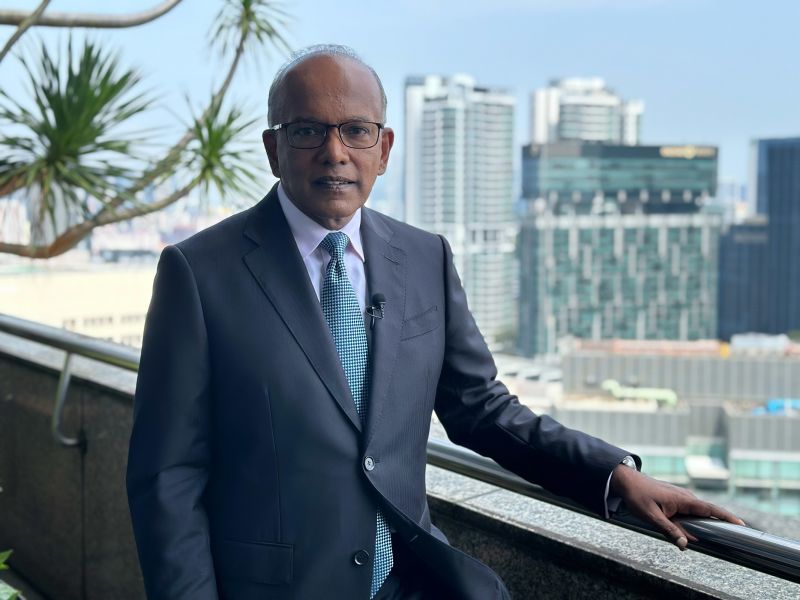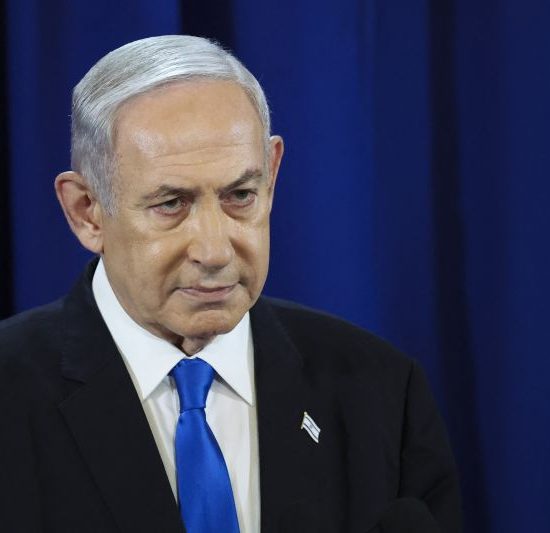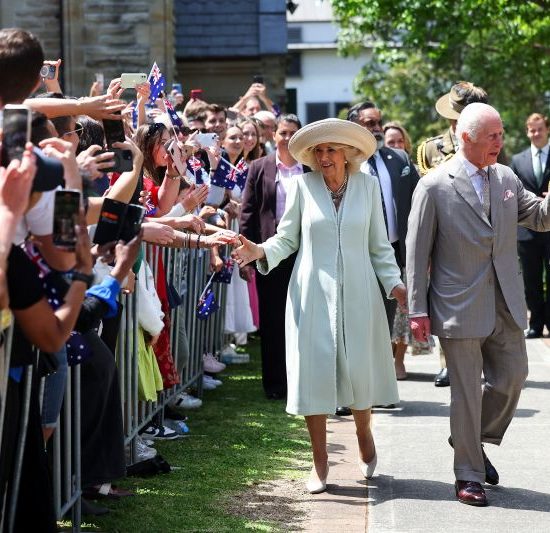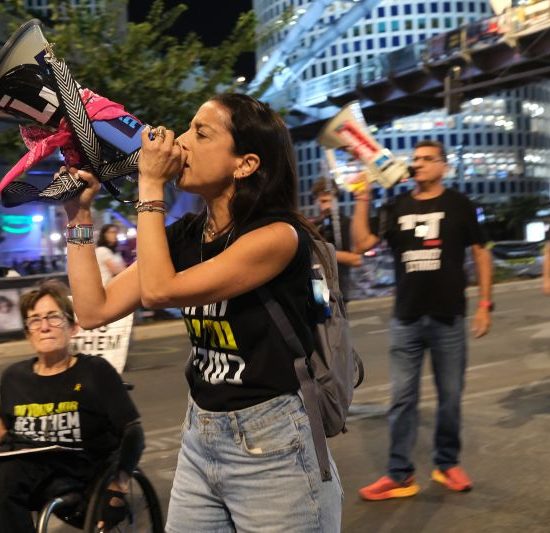Though he is provided with a straw mat, Matthew says he prefers to sleep on the concrete floor of his cell in the maximum-security wing of Singapore’s Changi Prison.
“It’s more cooling that way,” says the 41-year-old former schoolteacher, who was sentenced to more than seven years in prison and seven strokes of the cane for selling methamphetamine.
In recent years, dozens of US states and countries ranging from Canada to Portugal have decriminalized marijuana.
But Singapore imposes a mandatory death penalty for people convicted of supplying certain amounts of illicit drugs – 15 grams (half an ounce) of heroin, 30 grams of cocaine, 250 grams of methamphetamine and 500 grams of cannabis.
A 64-year-old man was hanged for drug offenses this week – the fourth person to be hanged so far this year.
The harsh sentencing puts the wealthy city-state in a small club of countries that includes Iran, North Korea and Saudi Arabia, which execute criminals convicted of drug offenses.
K Shanmugam, Singapore’s Minister for Home Affairs and Law, characterizes the country’s war on drugs as an “existential battle,” and claims any easing of the government’s hardline stance could lead to chaos.
“Look around the world,” Shanmugam says. “Any time there has been a certain laxity in the approach to drugs, homicides go up. Killings, torture, kidnappings … that goes up.”
A lucrative drugs market
Visitors to Singapore get a stark warning about the island’s zero tolerance for drugs as international flights descend for landing.
“Drug trafficking may be punishable by death,” a woman’s voice announces over the loudspeaker, amid instructions to passengers to buckle seat belts and stow away tray tables.
Many citizens of this Southeast Asian city-state are also aware that it is illegal for them to consume drugs overseas.
Returning Singaporeans and permanent residents run the risk of facing drug tests upon arrival.
“When you come back, and if there is a reason to believe you have taken drugs, you could be tested,” Shanmugam says.
Per capita, Singapore is one of the world’s wealthiest countries. With a population of nearly 6 million people, it has an annual GDP per capita of nearly $134,000.
This regional transport and financial hub has a reputation for safety, efficiency and strictness under de facto single-party rule.
The People’s Action Party, of which Shanmugam is a member, has governed Singapore since its independence nearly six decades ago.
Speaking from a balcony in the Home Affairs Ministry overlooking tidy neighborhoods of parks and villas, Shanmugam argues his country is a potentially lucrative market in a part of Asia he says is awash with drugs.
“If you are able to traffic into Singapore, the street price here compared to the street price in some other parts [of the world], it’s a magnet.”
Singapore stands in relatively close proximity to the notorious Golden Triangle, the mountainous intersection of Thailand, Laos and civil war-torn Myanmar. Last year, the United Nations Office on Drugs and Crime (UNODC) labeled the region the world’s largest source of opium. Production of methamphetamine in the region has also surged in recent years, outpacing heroin and opium.
Singapore’s anti-drug czar claims strict punishment serves as a deterrent to drug traffickers.
“Our philosophy on prisons is not the same as, say, the Scandinavian philosophy,” Shanmugam says. “We choose to make it harsh,” he adds. “It is not a holiday home.
“It is intended to be tough.”
Single cells in stifling heat
Singapore’s Changi Prison Complex is a walled compound of guard towers and imposing gates built in the shadow of the country’s main airport.
More than 10,000 prisoners are held here, and according to the prison’s latest annual report, most are serving time for drug offenses.
A network of security cameras mounted inside and outside individual cells and even over toilets allow just five guards to monitor the entire floor.
At mealtimes, the metallic clang of shutting gates echoes through the cell block, as a prisoner distributes meal trays through a ground-level hatch at the bottom of each cell door.
His single-occupancy cell is austere, measuring just 7 square meters (75 square feet), with a squat toilet beneath a shower. Inmates are not allowed to have furniture, so there’s no bed or anything to sit on.
It is also steam-bath hot year-round in Singapore’s tropical climate, where maximum daily temperatures regularly rise above 30 degrees Celsius (86 Fahrenheit).
The effect of extreme heat on prisoners has become more of a concern around the world as temperatures rise due to climate change.
“You will notice that there aren’t any fans or aircon,” Matthew explains. “There are some periods of time where it’s unbearable.”
Asked whether the threat of the death penalty had any deterrent effect on his drug dealing, Matthew says, “I would like to say yes.”
“But the truth is at that point in time I wasn’t thinking about it. In fact, I was actively avoiding the whole issue of consequences.”
‘Captains of life’
The prison’s deliberately harsh conditions contrast sharply with abundant emotional wellness messaging in the facility’s common areas.
The workshop, where prisoners pack anti-dandruff shampoo and instant coffee for a small salary, is plastered with motivational quotes from luminaries such as Steve Jobs and Nelson Mandela.
Cartoon characters and photos of waterfalls decorate classrooms where prisoners get lessons in anger management and job training.
Officials from the Singapore Prison Service say they encourage guards to think of themselves as “Captains of Life,” helping rehabilitate the prison population.
From an air-conditioned room known as “the fish tank,” they monitor inmates on live feeds from dozens of security cameras positioned around the prison.
Reuben Leong, the officer in charge of the correctional unit, says the job is not without risk. Violent incidents – usually fights between inmates – take place every few weeks, he says.
“There will be periods of time where they can be demanding, they can be rude, they can be hostile to you,” he adds.
The Yellow Ribbon Project is a government program aimed at rehabilitating former convicts, with job placement and community engagement.
Despite these efforts, Singaporean officials say roughly one in five former prisoners will likely end up back behind bars within two years. By comparison, one in three return to prison within two years in the United States, which has some of the highest recidivism rates in the world.
Meanwhile, there is no rehabilitation for death row inmates.
Singapore executed 11 prisoners by hanging in 2022, and five last year, according to the latest figures. All were convicted of drug charges.
‘Give my son a second chance’
Outside the prison walls, relatives of death row inmates hold an agonizing vigil awaiting the fate of their loved ones.
Halinda binte Ismail has a shock of bleach blond hair and sports a small stud in her left nostril.
By her count, the 61-year-old has been in prison at least seven times, always for drugs. Halinda says she was just 12 when she first smoked heroin.
Her last arrest was in 2017, when police raided the building where she lived with her eldest son, Muhammed Izwan bin Borhan.
Both mother and son were convicted for narcotics. But while Halinda ended up serving five years, her son was sentenced to death after police caught him with six packets of meth and heroin, according to court documents. He is still in prison, awaiting execution.
“I’m very angry with why the government doesn’t give [my son] a chance to change his life,” Halinda says.
“I always pray to the government ‘give my son a second chance.’”
Halinda is now part of a small movement of activists seeking to ban Singapore’s death penalty.
“It’s not solving anything, and it’s just disproportionately used against some of the most marginalized and weakest people in society,” says Kirsten Han, a journalist and activist with the Transformative Justice Collective, who lobbies on behalf of death row inmates.
“I just feel like it’s very morally wrong.”
Han’s outspoken criticism of Singapore’s system of executions has won her the personal enmity of Shanmugam, the Home Affairs minister.
However, Shanmugam confirms one of Han’s observations.
Among more than 40 inmates he says are currently on death row, most are in the “lower social-economic category.”
One of the 11 prisoners executed in 2022 for drug offenses was Nazeri bin Lajim.
“I was hoping that they [would] give him the life sentence, but they literally hanged my brother,” says his surviving sister Nazira.
Nazira says her brother was a life-long drug addict, but not a violent man.
She shows a series of portraits in her phone of Nazeri, dressed in a brightly printed T-shirt, smiling and holding up a victory sign for the camera.
Before each execution, authorities organize a professional photo shoot in which inmates trade their prison uniforms for civilian clothes.
Nazira doesn’t appreciate the gesture.
“It’s fake happiness,” she says.
She says she is encouraging her adult children to leave Singapore permanently to emigrate to Australia.
War on drugs
Singaporean officials point to surveys that show overwhelming public support for the government’s war on drugs.
In public appearances, Shanmugam often highlights public drug use on the streets of European and American cities to justify Singapore’s approach to the problem.
But it may be more fitting to compare Singapore’s record with Hong Kong, another former British colony that has a zero-tolerance approach to drugs.
Hong Kong’s population is around 25% larger than Singapore’s, and it does not impose the death penalty for drug offenses.
Yet despite its considerably larger population, Hong Kong made 3,406 drug arrests in 2023 – just a few hundred more than the 3,101 drug arrests in Singapore.
And according to Shanmugam, drug arrests in Singapore surged 10% in 2023 – suggesting that perhaps the threat of death is failing to act as a deterrent to crime.
“It’s a fight that you never say you’ve won,” Shanmugam says.
“It’s a continuous work in progress.”





